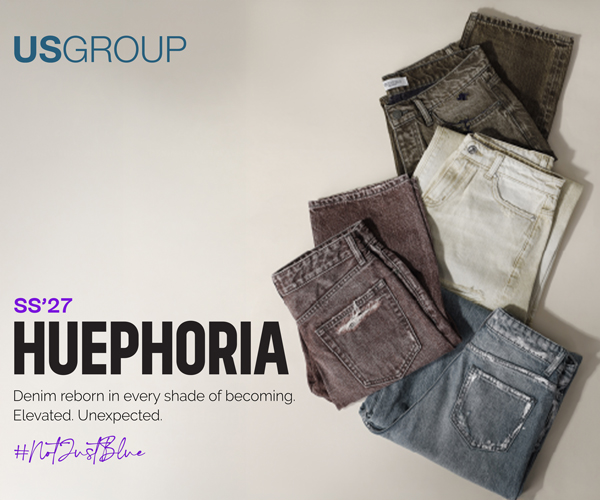Factory Talk: Taypa unlocks social sustainability

With facilities in Turkey, Serbia, Egypt and Algeria, the fabric and garment manufacturer is aiming to produce 50 million garments per year by 2021. Ikeme Audrey Eshemokhai discovers how employee wellbeing is at the centre of the operation during a visit to its facility in Turkey.
‘Sustainability’ has become a bit of a marketing term and is increasingly overused, but at Taypa sustainability is incorporated into every aspect of the production value chain, and crucially, includes social as well as environmental factors. On a visit to its Turkish facility, Nilgün Yazkan, the group’s corporate and social responsibility manager, told me, “In today’s world, where rapid change is part of our lives, sustainability makes it easier for us to adapt and helps us to leave a more habitable world for future generations. Sustainability needs to be prioritised in every aspect of our job; we reduce our impact on the environment through energy and water efficiencies and contribute to economic and social development through regular employment and growth.”
The company publishes a sustainability report each year, providing transparency for their business partners and stakeholders. Last year, Taypa decreased energy consumption by 14% even though overall production increased 7% by converting 75,000 square metres to low-energy LED. Half its electricity is supplied by renewable sources such as solar power or wind energy. An evaporative cooling unit chills the hot air during the summer, helping to maintain the temperature of the laser section and rendering air conditioners redundant. This results in an 82% electricity saving.
Anyone who has ever set foot in a laundry knows the temperature is usually very high and soars during summer months. This is due in part to the machines, especially the dryers. I discovered their Hot Steam Reuse Project collects steam in a tank and then reuses it during the washing process. The objective is to reduce the natural gas consumption by 12-14%, which equates to an impressive saving of 331,000 cubic metres.
From water to chemicals
One of the key areas in denim washing is water consumption. To me, Taypa’s Taystone Project stood out. Instead of using conventional pumice stones that give your jeans that naturally stonewashed look, synthetic stones are used, consisting of two types of polymers. They can be employed more than 5,000 times in bulk production, making them much more durable than pumice stones.
As you may already know, the grit pumice stones produce creates an environmental problem, besides the deterioration of industrial washing machines and the hazard of inhaling dust particles when workers have to physically remove the residue of pumice stones caught in some of the garments’ pockets. This all sounds very good, but naturally, I had a lot of questions: “Since Taystones are made from synthetic polymers, will there be plastic microfibres in the wastewater? Once they are no longer usable, what will happen to them? How will they be recycled?”
I was assured that even after the 5,000th use there is no weight loss and they are indeed recyclable. Currently, Taystone is used in 25% of the overall denim bulk washing but their aim is to increase that to 50% by the end of the year. In addition, Taypa has committed to keep their EIM (Environmental Impact Measuring) scores low by using ozone and laser technology as well as other machines. This score is also directly influenced by the chemical usage. Taypa has significantly reduced hazardous chemicals but also consumption by an auto-dosing system which provides traceability, energy saving and occupational safety.
How about the human factor?
When it comes to sustainability, we talk so much about the environmental impacts of the denim industry but hardly ever mention employees in the value chain. Companies that invest in social sustainability have realised that one of the results is product innovation, which can help to attract new markets and retain existing business, and this so often boosts morale as well as employee engagement. “It is not just a pair of jeans we are producing,” sales and marketing director Banu Acun tells me, “it is a total value chain consisting of morals and codes of ethics.”
She is among the 68% of employees in the company who are women and, with a high percentage of women in management positions, Taypa has unlocked one of the pillars of social sustainability: the empowerment of women. Besides increasing productivity and broadening the talent pool, research shows women tend to put most of their income back into their families and local communities.
The company also offers continuous training as well as loyalty programmes and incentives. For the academic year 2019-2020, Taypa gifted employees’ children with a backpack and school supplies. It also provides seminars on design and denim washing across several universities in Istanbul. The training is conducted by Cenker Akdemir, the R&D and design director, who hopes that one day this talent might join Taypa. “Innovation and design are two words that best define our company culture,” he explains. “Our aim is to offer our customers fast, high-quality and future-oriented designs which are, most importantly, sustainably produced.”
Innovation is directly linked to providing opportunities and investing in communities. What impressed me the most was the charitable programmes the company supported last year, such as gifting clothing to children with cancer living in the KAÇUV Family Homes, donating to animal shelter Encander and providing aid packages to the Red Crescent. Employees are encouraged to take part in activities ranging from running for social change to cleaning coasts to protect ecosystems.
Taypa leads as an example of what the future of manufacturing can look like. Mesut Toprak, Taypa’s chairman, perfectly sums up, “Not only have we grown in size over the years, we have also developed our values and principles together. Our greatest strength comes from our employees, customers, suppliers and stakeholders, who share our vision and dream.”
Ikeme Audrey Eshemokhai is a denim design consultant who has worked with some of the biggest fast fashion retailers and premium denim brands. She started her career as a sportswear and lifestyle apparel designer before discovering her love for denim. She is now focused on bringing about change in the industry towards more ethical and sustainable denim creation and manufacturing.













